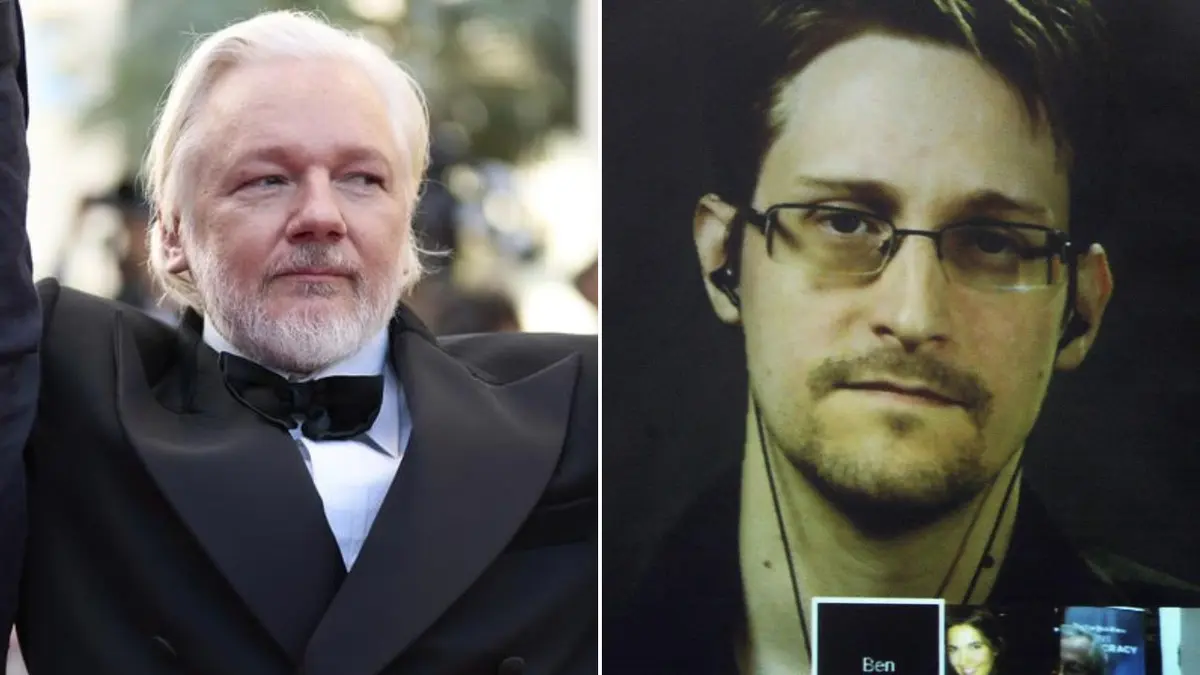Online activists Julian Assange and Edward Snowden have divided opinion over the last two decades with their actions that exposed military secrets and government surveillance programs to the world.
Some see them as heroes of journalism and freedom of information, and others view the pair as traitors of the West.
Last year Assange — the founder of WikiLeaks — pleaded guilty to conspiring to obtain and disclose US defence information.
Know the news with the 7NEWS app: Download today
The Australian has been free for a year but isn’t free from condemnation.
Once described as the world’s most wanted man, Edward Snowden remains in Russia after exposing global surveillance programs conducted by the United States’ National Security Agency (NSA).
Retired Admiral Mike Rogers was the 17th director of the NSA and took control in the year after Snowden’s leaking, as the US also pursued Julian Assange.
He says both men made the wrong choice.
“I would totally disagree with the course of action that they both chose,” Rogers told 7NEWS podcast The Issue.
“My view is there are mechanisms to address legitimate concerns. Theft of classified information is not one of the ways to do it, nor is trying to co-opt others to do so a way to do it.”
Distrust in institutions
When asked if the pair’s behaviour led to a greater distrust in institutions, Rogers – a former adviser to Barack Obama and Donald Trump — replied that he believes the public has always been sceptical about governments.
“Well, I’ll only speak for my nation. Look, in America, there has always been a strong measure of distrust or concern around the power of government over its citizens,” Rogers said.
“Whether that’s government’s knowledge of citizens and their activities and preferences or what they choose to do, say, believe, feel, support — that’s always been an element in the American construct. We overthrew an empire, and we told the King, ‘Hey look nobody in London is going to tell us what to do’.
“I never had a problem with that. That’s part of being in a democracy. The way you try to mitigate those concerns, which are very valid, is what kind of oversight do you have? What kind of checks and balances do you have? What kind of independent reviews do you have? What kind of legal frameworks do you have in place to ensure you’re not abusing the authority, abusing the capability or the power that’s been placed in your hands?”
Biggest threat to democracies
The OECD (Organisation for Economic Co-operation and Development) says just 46 per cent of Australians trust the government, and 34 per cent trust political parties.
Australia Policy Online has released a report into May’s federal election.
A total of 60 per cent of respondents said they came across election misinformation sometimes, very often or occasionally in the two weeks prior to the election.
And only 40 per cent were extremely or quite confident they can check if a website or social media post can be trusted.
Rogers believes misinformation is the most pressing threat to democracies such as Australia and the USA.
He says there is a conflict between freedom of expression, and modern technologies like artificial intelligence and social media.
“My concern is how do you deal with concerted efforts by nation states, groups and individuals to use misinformation and disinformation, to alter images, to present an inaccurate or distorted picture, to assert falsehoods as fact,” Rogers told The Issue.
“How do you deal with that in a nation — it’s true in Australia, it’s true in the United States — where freedom of expression is a foundational core tenant of our very belief in ourselves as societies.
“How do you deal with truth in a world in which it is constantly being assaulted or manipulated, in a framework in which the ability to lie, if you will, has an element of protection. That is not an easy challenge in a democratic society.”
Solutions to the issue
Rogers who now works as a global adviser for Australia’s leading cyber security firm CyberCx — and contributed to the Australian Government’s 2023 cybersecurity strategy — says there is not one solution to the issue.
“It’s going to be a combination, I think, of policy and law, behaviour by the owners of the platforms that are hosting it and then all of us as individuals,” he said.
“For example, I have this discussion with my family all the time. We no longer live in an age where just because you saw something or heard something or read something that it is automatically accurate.
“I think for citizens, look, we need to be much more sceptical. We need to say, ‘OK, I’ve read this could be true. How might I verify it? What do other sources say about this? Does it make sense? Does it match with anything I’ve seen or already know?’ I just think we have to be a little bit more discerning, and we have to be a little bit more sceptical in terms of not just accepting things at face value.”
You can watch more of his conversation with The Issue on YouTube or listen wherever you get your podcasts.


